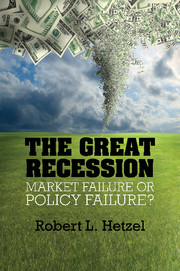Book contents
- Frontmatter
- Contents
- Figures
- Tables
- Preface
- One The 2008–2009 Recession
- Two Recessions
- Three The Great Contraction
- Four Monetary Policy and Bank Runs in the Great Depression
- Five Vigorous Recovery and Relapse
- Six Interwar International Monetary Experiments
- Seven Identifying the Shocks that Cause Recessions
- Eight From Stop-Go to the Great Moderation
- Nine Controlling Bank Risk Taking
- Ten The Housing Crash
- Eleven Bubble Trouble
- Twelve What Caused the Great Recession of 2008–2009?
- Thirteen What Caused the Great Leverage Collapse?
- Fourteen The Distinctions Between Credit, Monetary, and Liquidity Policy
- Fifteen Fed Market Interventions
- Sixteen Evaluating Policy
- Seventeen The Business Cycle
- Eighteen Why Is Learning So Hard?
- Nineteen How Should Society Regulate Capitalism?
- Postscript
- Bibliography
- Index
Eight - From Stop-Go to the Great Moderation
Published online by Cambridge University Press: 05 May 2012
- Frontmatter
- Contents
- Figures
- Tables
- Preface
- One The 2008–2009 Recession
- Two Recessions
- Three The Great Contraction
- Four Monetary Policy and Bank Runs in the Great Depression
- Five Vigorous Recovery and Relapse
- Six Interwar International Monetary Experiments
- Seven Identifying the Shocks that Cause Recessions
- Eight From Stop-Go to the Great Moderation
- Nine Controlling Bank Risk Taking
- Ten The Housing Crash
- Eleven Bubble Trouble
- Twelve What Caused the Great Recession of 2008–2009?
- Thirteen What Caused the Great Leverage Collapse?
- Fourteen The Distinctions Between Credit, Monetary, and Liquidity Policy
- Fifteen Fed Market Interventions
- Sixteen Evaluating Policy
- Seventeen The Business Cycle
- Eighteen Why Is Learning So Hard?
- Nineteen How Should Society Regulate Capitalism?
- Postscript
- Bibliography
- Index
Summary
In 2004, Governor Bernanke gave a speech stating his understanding of the reasons for the improved performance of the economy starting in the early 1980s known as the Great Moderation. He attributed the better economic performance to an improvement in monetary policy. Bernanke (2004, 9) expressed optimism about future economic activity based on a belief “that monetary policymakers will not forget the lessons of the 1970s.”
What are those “lessons?” This chapter first presents the critique made by monetarists of the alternations in the stance of monetary policy in the late 1960s and the 1970s labeled contemporaneously as “stop-go.” The chapter concludes by arguing that this monetarist view is a better starting point for understanding the change in monetary policy from the 1970s to the 1980s than the more recent characterization offered by John Taylor.
Bernanke‘s understanding of appropriate policy, based on the work of Taylor, foreshadowed the monetary policy of the FOMC in spring and summer 2008. At this time, inflation (especially headline inflation but also core inflation) had persistently exceeded the FOMC‘s unstated inflation target. From spring through fall 2008, the FOMC let its funds rate target unchanged despite the steady growth in a negative output gap (Chapter 12). The FOMC countered inflation directly through the attempted manipulation of a negative output gap. The argument here is that it misunderstood the lessons offered by the contrasting experience of the Great inflation and the Great Moderation.
- Type
- Chapter
- Information
- The Great RecessionMarket Failure or Policy Failure?, pp. 128 - 148Publisher: Cambridge University PressPrint publication year: 2012



